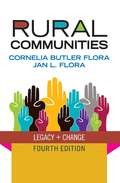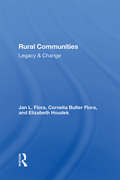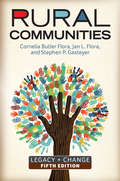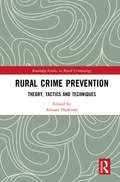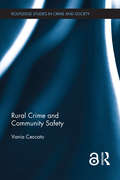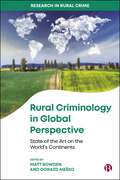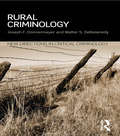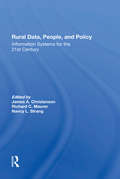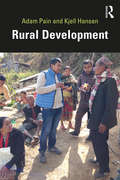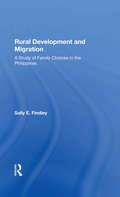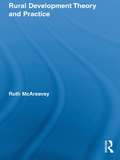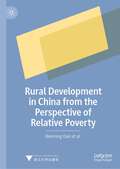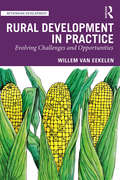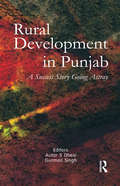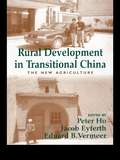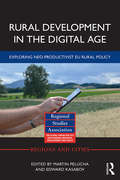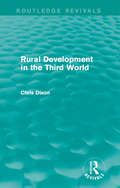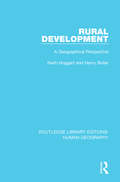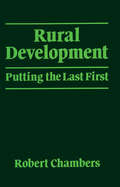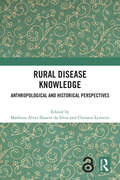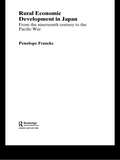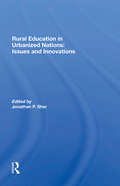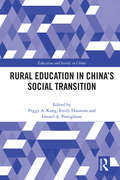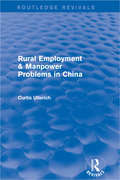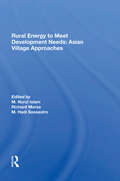- Table View
- List View
Rural Communities
by Cornelia Butler Flora Jan L FloraRural Communities: Legacy and Change examines the diversity of rural America: its unique communities, histories, and social issues. It also considers how rural communities use their increasing connectedness to creatively address modern challenges in the face of increasing globalization and climate change. Focusing on various capitals in rural areas--natural, cultural, human, social, political, financial, and built--this book provides students with an essential framework for understanding rural society based on the concepts of social science. The fourth edition of Rural Communities covers vital issues such as: racial and cultural diversity in rural areas; globalization and increasing tensions over international immigration; the impact of the wars in Iraq and Afghanistan; the central role of communities in organizing a sustainable future; and building community in the context of ubiquitous change. Chapter opening vignettes present real people and communities, illustrating the application of concepts. Updated with 2010 Census data, the fourth edition features new coverage of local food movements, climate change, the impacts of the global financial crisis, and updates on immigration as it relates to rural societies.
Rural Communities Study Guide: Legacy + Change
by Jan L. Flora Mark Weinberg Cornelia Flora Elizabeth HoudekThis book examines the process of rural community development and transition—exploring the ways in which history, culture, and policies limit change as well as the extent to which local community resources can mobilize to support efforts for community change.
Rural Communities: Legacy + Change (Advances In Agroecology Ser.)
by Cornelia Butler FloraCommunities in rural America are a complex mixture of peoples and cultures, ranging from miners who have been laid off in West Virginia, to Laotian immigrants relocating in Kansas to work at a beef processing plant, to entrepreneurs drawing up plans for a world-class ski resort in California's Sierra Nevada. Rural Communities: Legacy and Change uses its unique Community Capitals framework to examine how America's diverse rural communities use their various capitals?natural, cultural, human, social, political, financial, and built?to address the modern challenges that face them.Each chapter opens with a case study of a community facing a particular challenge, and is followed by a comprehensive discussion of sociological concepts to be applied to understanding the case. This narrative, topical approach makes the book accessible and engaging for undergraduate students, while its integrative approach provides them with a framework for understanding rural society based on the concepts and explanations of social scienceThis fifth edition is updated throughout with 2013 census data and features new and expanded coverage of health and health care, food systems and alternatives, the effects of neoliberalism and globalization on rural communities, as well as an expanded resource and activity section at the end of each chapter.
Rural Crime Prevention: Theory, Tactics and Techniques (Routledge Studies in Rural Criminology)
by Alistair HarknessRural crime has long been overlooked in the field of crime prevention. Sustained academic interrogation is necessary, therefore, to reduce the extensive economic and social costs of rural crime as well as to challenge some of the myths regarding the prevention of rural crime. Rural Crime Prevention: Theory, Tactics and Techniques critically analyses, challenges, considers and assesses a suite of crime prevention initiatives across an array of international contexts. This book recognises the diversity and distinct features of rural places and the ways that these elements impact on rates, experiences and responses. Crucially, Rural Crime Prevention also incorporates non-academic voices which are embedded throughout the book, linking theory and scholarship with practice. Proactive responses to rural offending based on sound evidence can serve to facilitate feelings of safety and security throughout communities, enhance individual wellbeing and alleviate pressure on the overburdened and typically under-resourced formal elements of the criminal justice system. This book provides an opportunity to focus on the prevention of crime in regional, rural and remote parts of the globe. An accessible and compelling read, this book will appeal to students and scholars of criminology, policing, sociology and practitioners interested in learning about the best-practice international approaches to rural crime prevention in the twenty-first century.
Rural Crime and Community Safety (Routledge Studies in Crime and Society)
by Vania A CeccatoCrime is often perceived as an urban issue rather than a problem that occurs in rural areas, but how far is this view tenable? This book explores the relationship between crime and community in rural areas and addresses the notion of safety as part of the community dynamics in such areas. Rural Crime and Community Safety makes a significant contribution to crime science and integrates a range of theories to understand patterns of crime and perceived safety in rural contexts. Based on a wealth of original research, Ceccato combines spatial methods with qualitative analysis to examine, in detail, farm and wildlife crime, youth related crimes and gendered violence in rural settings. Making the most of the expanding field of Criminology and of the growing professional inquiry into crime and crime prevention in rural areas; rural development; and the social sustainability of rural areas, this book builds a bridge by connecting Criminology and Human Geography. This book will be suitable for academics, students and practitioners in the fields of criminology, community safety, rural studies, rural development and gender studies.
Rural Criminology in Global Perspective: State of the Art on the World's Continents (Research in Rural Crime)
by Matt Bowden and Gorazd MeškoThis timely collection crosses international boundaries to highlight criminological issues with a rural focus. Using a variety of different perspectives, the contributors offer lessons from research on rural crime, justice and security from the seven continents with a macroscopic perspective on issues of international concern. The book identifies the global context in which rural crime takes place, presenting insights on crime prevention, safety and security to students, researchers, policymakers and practitioners. Chapters 2 and 8 available open access digitally under CC-BY-NC-ND licence.
Rural Criminology: Rural Criminology (New Directions in Critical Criminology)
by Joseph F Donnermeyer Walter DeKeseredyRural crime is a fast growing area of interest among scholars in criminology. From studies of agricultural crime in Australia, to violence against women in Appalachia America, to poaching in Uganda, to land theft in Brazil -- the criminology community has come to recognize that crime manifests itself in rural localities in ways that both conform to and challenge conventional theory and research. For the first time, Rural Criminology brings together contemporary research and conceptual considerations to synthesize rural crime studies from a critical perspective. This book dispels four rural crime myths, challenging conventional criminological theories about crime in general. It also examines both the historical development of rural crime scholarship, recent research and conceptual developments. The third chapter recreates the critical in the rural criminology literature through discussions of three important topics: community characteristics and rural crime, drug use, production and trafficking in the rural context, and agricultural crime. Never before has rural crime been examined comprehensively, using any kind of theoretical approach, whether critical or otherwise. Rural Criminology does both, pulling together in one short volume the diverse array of empirical research under the theoretical umbrella of a critical perspective. This book will be of interest to those studying or researching in the fields of rural crime, critical criminology and sociology.
Rural Data, People, And Policy: Information Systems For The 21st Century
by Lis M. Maurer Nancy Strang James A ChristensonThis volume paints a critical view of the state of rural data systems in America with a collection of contributions leading scholars in the social sciences arena. It places an important wake-up call social scientists engaged in rural research, alerting them to the problems of existing data systems.
Rural Development
by Adam Pain Kjell HansenRural Development is a textbook that critically examines economic, social and cultural aspects of rural development efforts both in the global north and in the global south. By consistently using examples from the north and the south the book highlights similarities of processes as well as differences in contexts. The authors’ knowledge of Afghanistan and Sweden respectively creates a core for the discussions which are complemented with a wide range of other empirical examples. Rural Development is divided into nine chapters, each with a thematic focus, ranging from concepts and theories through rural livelihoods and natural resources to discussions on policy and processes of change. The book sees rural development as a multi-level, multi-actor and multi-faceted subject area that needs multidisciplinary perspectives both to support it and to analyse it. Throughout the book examples of rural development interventions are discussed using analytical concepts such as power, discourse, consequences and context to grasp rural development as practices that are more than what is presented in policy documents. The book is written in a way that makes it accessible for undergraduates while at the same time caters for the kind of deeper reading used by master students and Ph.D.’s. Every chapter is linked to discussion questions as well as suggested further readings and useful websites.
Rural Development And Migration: A Study Of Family Choices In The Philippines
by Calvin Goldscheider Sally E. FindleyPerhaps because I grew up on a farm in Ohio, I have long been interested in rural development. Although I fll'St became a migrant at the age of 17 when I left the farm to continue my studies in a city college, I was not aware of the relation between rural development and migration until many years later when I began studying patterns of urban and rural poverty. This research has grown out of my continuing investigation of the ways that migration .has been seen as both a response to chronic conditions of rural poverty and a factor potentially exacerbating urban poverty conditions. If governments wanted to deal with urban poverty, they would want to restrict urban in-migration, yet if they reduced urban in-migration, this would remove one of the important means available to persons seeking to raise themselves out of rural impoverishment. This would clearly be a no-win situation for the rural poor; the only way to deal fairly with both urban and rural poverty would be to foster socio-economic development of rural areas. Thus, I became interested in studying the patterns of rural development which actually have had an effect on the migration decisions of rural families.
Rural Development Theory and Practice (Routledge Studies in Development and Society)
by Ruth McAreaveyRural development is inherently viewed as a positive thing; it is seen as something that brings together groups of individuals with automatic positive implications and outcomes. Policy rhetoric frequently uses popular terms such as involvement, participation and power sharing to describe rural development activities. However, the reality of experience on the ground does not necessarily concur with these ideals. It is not always clear who ultimately benefits from rural development: the State, the community or rural development practitioners. This book critically analyses key concepts associated with rural development policy and practice, and using the concepts of power and micro-politics to analyze rhetoric and reality, reveals the intricacies of rural development. Challenging popular ideals associated with rural development, this book presents the notion of rural development less as a spontaneous, all-inclusive affair and more as a limited, controlled and exclusive process. Ultimately it contends that within structures of rural governance, a regeneration power elite predominates development and regeneration activities.
Rural Development in China from the Perspective of Relative Poverty
by Wenrong QianThis book provides a broad survey of Chinese rural households at a time of rapid change in China’s rural economy, examining the dual identity of households as consumers as well as producers of goods in terms of supply and demand. Based on the results of the China Rural Household Panel Survey (CRHPS) by Zhejiang University, this book analyzes four types of economic activities of rural households in China, particularly considering changes at the micro level. It examines how households strive to maximize family efficacy through input-output production decision-making in allocating limited resources. Examining data pertaining to agricultural production, land exploitation, migration and nationalization, as well as changes in economic behavior, this book offers a snapshot of the current situation of rural households in China and suggestions to improve living standards and related policies.
Rural Development in Practice: Evolving Challenges and Opportunities (Rethinking Development)
by Willem van EekelenRural Development in Practice focuses on the evolving nature of rural development in the Global South. It outlines how we got to where we are today, checks what we can learn from history, and explores the development drivers, facilitators, and obstacles most likely to shape the years ahead. The book covers the management of fishing grounds, forests, grazing lands, water sources and soil, and looks at the effects of infrastructure, trade mechanisms, and new crop varieties on farming. The author discusses the opportunities and challenges of microfinance, social safety nets and migration, and assesses the way ICT and climate change are changing everything, rapidly. Real-life examples, exercises, role-plays, textboxes, anecdotes, and illustrative artwork are used to bring concepts and theories to life, and every chapter concludes with a section that explores how best to tackle the tough and complex dilemmas of our time. Rural Development in Practice is essential reading for students at all levels and may be of benefit for programme and policy staff in rural-focused government departments, multilateral agencies, and non-government organisations.
Rural Development in Punjab: A Success Story Going Astray
by Autar S. DhesiFor many years, agricultural development in Punjab symbolised one of the most successful experiments in rural development. However, this success story seems to be going astray. The crux of the problem, this volume suggests, is that externally driven modernization to meet national food needs pushed Punjab into highly specialized production of wheat and rice, resulting in over-utilisation of natural resources with adverse environmental consequences that jeopardizing the long-term viability and sustainability of the agrarian economy. Stagnating productivity, reduced farm size, falling household incomes, depleting groundwater resources, are only a few of the problems that characterise Punjab’s agriculture today. The book establishes clearly that rural development implies more than transformation of traditional agriculture. Apart from ensuring efficient use of limited resources to sustain agricultural production, rural policy should encompass promotion of non-farm activities, investments in social and economic structure and civic amenities.
Rural Development in Transitional China: The New Agriculture
by Peter Ho Jacob Eyferth Eduard B. VermeerSince the late 1970s, China has experienced the most rapid social and economic changes in world history. Over 200 million rural inhabitants were lifted out of absolute poverty and tens of millions became wealthier than the average urban resident.This book offers an authoritative and in-depth analysis of the social and economic changes that have swept through the Chinese countryside. Topics covered include: land tenure and rural labour, social welfare, poverty alleviation, rural resettlement, food security, natural resource management and rural industrialization.
Rural Development in the Digital Age: Exploring Neo-Productivist EU Rural Policy (Regions and Cities)
by Edward Kasabov Martin PěluchaRural Development in the Digital Age explores current theoretical and policy developments in EU rural policy during the 4.0 period. The book offers an analysis of the contradictory and complex drivers and multiple impacts of Period 4.0 policy within the specific territorial context of its implementation. It is commonly agreed within academic and policy circles that the contexts, trends, drivers and impacts which are currently morphing have the potential to determine the nature and boundaries of rural areas in the longer-term. The authors examine inconsistencies in the design and implementation of EU rural development policy driven largely by intensifying neo-productivist pressures. The importance and novelty of the book lie in defining and critically examining the territorial impacts of neo-productivism as an ideology, a practice and a set of policy imperatives during the EU’s 2014-2020 programming period. The authors argue that such a paradigm shift in EU rural policy may reduce its effectiveness and ability to meet its goals of balanced territorial development and cohesion. This book will be of interest to advanced students, researchers and policymakers in rural policy, regional studies, economic geography and EU policy.
Rural Development in the Third World (Routledge Revivals)
by Chris DixonThe rural landscape of the Third World is generally seen as one worked by the impoverished. Chris Dixon shows that this is an increasingly inaccurate picture. Wealth does exist, with the landed often maintaining lifestyles comparable to their richest urban neighbours. And while land remains the basis of real wealth, the rural workforce is diversifying its activities away from agriculture becoming involved in a range of manufacturing, processing, trading and service industries. Yet still rural poverty persists, and the book illustrates just how difficult it is to assess the success of development initiatives adopted to eliminate it. This book, first published in 1990, provides a general introduction to the approaches, policies, and problems associated with Third World rural development. Rural Development in the Third World is relevant to students of geography, the environment and developmental issues.
Rural Development: A Geographical Perspective (Routledge Library Editions: Human Geography #10)
by Keith Hoggart Henry BullerThis book, originally published in 1987, provides an integrative, analytical aproach to rural areas in advanced economies. Causation and the consequences of societal change have been emphasised, in a framework which draws out processes which oeprate at different geographical scales (and with varying intensities across space).
Rural Development: Putting the last first (World Development)
by Robert ChambersRural poverty is often unseen or misperceived by outsiders. Dr Chambers contends that researchers, scientists, administrators and fieldworkers rarely appreciate the richness and validity of rural people's knowledge or the hidden nature of rural poverty. This is a challenging book for all concerned with rural development, as practitioners, academics, students or researchers.
Rural Disease Knowledge: Anthropological and Historical Perspectives
by Christos Lynteris Duarte da Silva, Matheus AlvesRural Disease Knowledge examines the ways in which knowledge of rural spaces and environments, on the one hand, and infectious diseases, on the other, have become inter-constituted since the late nineteenth century. With contributions by leading anthropologists and historians of medicine, it examines the epistemic co-constitution of the rural and of infectious diseases. Ranging from Brazil, Argentina, and Colombia to Java, Tanzania, West and South Africa, and Britain, the chapters cover diverse geographies, timelines, and diseases, including plague, brucellosis, leishmaniasis, yaws, yellow fever, nagana, sleeping sickness, and Chagas disease. The book considers how human interactions with infectious diseases have impacted ways of knowing and acting on rural spaces and environments, and in turn how human interactions with rural spaces and environments have impacted ways of knowing and acting against infectious diseases. It reflects on how the rural has been configured as a space of either health or sickness over the centuries and around the globe, the role of rural landscapes in the epistemic emergence of microbiology and tropical medicine, and the interaction with global processes such as European imperialism, the emergence of capitalism, and postcolonial nation-building projects. The studies engage with current debates on decolonizing knowledge and highlight how local disease knowledge has troubled and unsettled hegemonic medical perspectives and created new ways of understanding the relationship between diseases and rural spaces and environments. The volume will be of particular interest to scholars of medical anthropology, global health, and the history of medicine.
Rural Economic Development in Japan: From the Nineteenth Century to the Pacific War (Routledge Studies in the Modern History of Asia #Vol. 32)
by Penelope FrancksIn the historical literature on Japan, rural people have tended to be regarded as the exploited victims of the industrialisation process. This book provides an alternative view of the role and significance of the rural economy in Japan’s emergence as an economic power prior to World War II. Using theories and approaches derived from development studies and economic history the book describes the nineteenth-century development of a diversified, proto-industrial rural economy, focusing on the strategies employed by households as they sought to secure and improve their livelihoods. The book argues that rural people, through their ‘industrious revolution’, played an active part in determining the course of Japan’s agrarian transition and, eventually, the distinctive features of industrial Japan’s political economy, with the result that rural life still figures largely in the reality and imagination of contemporary Japan.
Rural Education In Urbanized Nations: Issues And Innovations
by Jonathan P SherA reversal in rural-to-urban migration patterns is creating increasing interest in the quality of education in rural areas and in techniques for meeting educational needs in sparsely populated regions. Wholesale urbanization of rural schools generally is rejected as a potential solution: it is logistically inefficient; centralization and standardization are met with growing resistance; and conventional solutions to educational problems produce uneven results when applied to rural areas. This book addresses the broad spectrum of rural education issues within OECD member countries. The authors identify innovative programs, policies, and strategies and point toward the more promising paths for rural school improvement. They also issue warnings about some of the blind alleys and dead ends that can be encountered. The major topics covered include delivery systems, in-school innovations, support mechanisms, and community-school linkages.
Rural Education in China’s Social Transition (Education and Society in China)
by Peggy A. KongIn the first decade of the twenty-first century, the People's Republic of China experienced dramatic growth and expansion that altered the educational environment of children. Rapid economic development increased prosperity and educational opportunities for children expanded in a wealthier society. Yet, a by-product of rising wealth was rising inequality. While the children of the emerging urban middle and elite classes enjoyed new prosperity, the children of hte persistently poor in rural communities continued to experience challenges such as food insecurity, illness, hardships of family separation, and migrant life on the margins of the cities. This time period saw a large resource gap emerge between the home conditions of poor rural children compared with those of their wealthier urban counterparts. This book highlights the complexities China has experienced in seeking to extend full educational access to rural children— including rural- to- urban migrant and ethnic minority children—during a momentous period in China. Chapters delve into the experiences, perceptions, strategies, and diffi culties of rural- origin children and their families in the school system, and lay bare the challenges of policy initiatives designed to support rural education. We hope the experiences detailed here will be of interest to students and scholars of rural educational policy and practice in China and worldwide.
Rural Employment & manpower problems in China
by Curtis UllerichThis title was first published in 1978
Rural Energy To Meet Development Needs: Asian Village Approaches
by M. Nurul Islam Richard Morse M. Hadi Soesastro Marwoto Hadi SoesastroThis volume had its origin at a conference held in 1978 at the East- West Center that considered the short- and long-term energy problems of the Asia-Pacific region. That group of national energy policymakers, scientists, and technologists agreed that providing adequate energy for the rural areas of the developing countries looms large as one of the more critical problems of the region. Encouraged by this consensus, the East-West Resource Systems Institute obtained a grant from the Agency for International Development for the purpose of initiating a collaborative, multi-country study of rural energy problems. The National Research Council of Thailand and the East-West Center agreed to work closely together as twin foci for the coordination of the effort.
